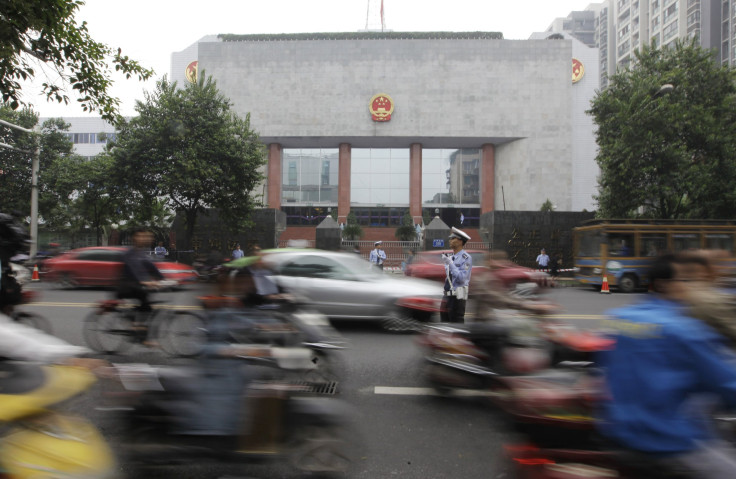China Road Rage: Brutal Attack On Female Driver Unleashes Public Anger Over Lawless Roads

SHANGHAI -- Chinese television viewers and Internet users were shocked this week by a film of a young man dragging a female driver out of her car under a road bridge in the southwestern city of Chengdu, throwing her on the ground, and kicking her brutally across the road.
The man, identified only as Mr Zhang, also attacked members of the public who quickly surrounded his car, stopping him from driving away. One taxi driver was cut with a screwdriver, before Zhang was eventually taken away by police. The woman, identified only as Ms Lu, is now in hospital, suffering from a concussion, broken bones and serious bruising.
Internet users angrily criticized the man, whose explanation was that the woman had changed lanes suddenly in front of his own car, forcing him to break abruptly, and scaring his son, who was sitting in the back seat with his mother at the time. Zhang, who is now in police custody, is reported to have later filmed an apology to Lu, and called on young drivers to be more tolerant and not to copy his behavior.
However, after footage from the dashboard camera in Zhang’s own car appeared online, showing Ms Lu’s red Hyundai swerving across in front of Zhang at high speed, some commentators began to express different views. According to a report on Shanghai’s Dragon TV channel on Tuesday, “many people have been praising him for the attack, saying a driver like this deserves to be attacked.”
The TV report quoted a Chinese newspaper commentary, which said that Zhang had clearly been wrong to attack Lu, but also raised the question of why people felt it necessary to take the law into their own hands in this way. The commentary asked whether the attack had occurred because “people who drove chaotically on China’s roads and broke traffic rules were not punished sufficiently, and so more and more people were driving in this way, leading to cases of road rage.”
Other voices disagreed: a commentator in the China Youth Daily said anyone who said they cared about obeying traffic rules and then expressed sympathy for such a brutal attack was guilty of double standards -- and he called on people to be strict with themselves as well as others.
However the case clearly highlights growing tension over dangerous driving on China’s roads: car ownership has expanded rapidly in recent years -- of the estimated 125 million cars now on China’s roads, more than 20 million were purchased last year alone. And observers say some new drivers pay little respect to traffic regulations.
More than 87,000 people died on China’s roads in the first 10 months of last year; the city of Shanghai, meanwhile, recently reported an average of approximately three road deaths a day in the first quarter of this year -- though officials said this was a 31 percent fall from a year earlier. And cases of bad driving causing accidents and deaths are frequently reported in the Chinese media.
Public anger -- especially from those who cannot afford expensive cars -- is commonly expressed. In one case a few years ago, an old man who sat by traffic lights near his home in northwest China and threw rocks at drivers who jumped the red light, won widespread public sympathy.
In another recent case, there was much public criticism of two young men who crashed while racing their cars -- a Ferrari and a Lamborghini -- on a Beijing highway last month. On Monday police charged the men, aged 20 and 21, with dangerous driving.
The Chinese government has recently announced plans to relax rules on how people learn to drive -- allowing them to take lessons with family members or friends, rather than only in official driving schools as in the past. Officials have said they hope this will encourage more people to take lessons over a longer period, and make it less likely that driving schools accept bribes to help people pass their tests. But some critics have expressed concern that this could lead to even less respect for traffic rules.
One of China’s most popular bloggers, Han Han, who is a rally car driver as well as a writer, wrote a few years ago that behavior on the roads was a symbol of China’s social climate. He said that only when Chinese drivers had enough respect for other people to dip their headlights when approaching another car, would the country be ready for any form of democracy.
© Copyright IBTimes 2024. All rights reserved.












